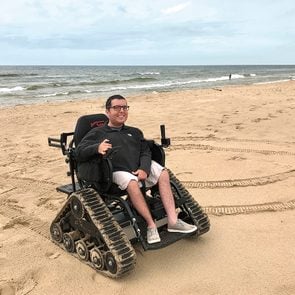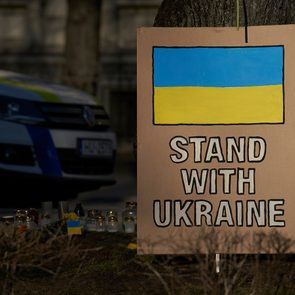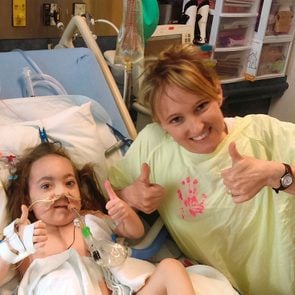These Families Are Providing a Home—And Hope—For Refugees
People who welcome the world's displaced take a giant, generous leap of faith. Here are three of their stories.
They come from Africa, Central Asia, the Middle East and Ukraine. According to the United Nations High Commissioner for Refugees, in 2022 more than 100 million people were forcibly displaced from their homes by war, famine, natural disasters or persecution. These displaced refugees flee with the few possessions they are able to carry, their lives suddenly in limbo.
What happens to them? Some 4.5 million find sanctuary in United Nations-sanctioned refugee camps; at least two million are in “self-settled” camps; and countless others shelter in foreign cities—rooms in hotels and community centres, or basic apartments from where they try to launch new lives.
A lucky few are welcomed into private homes, sharing space with people who want to help, often for a few months. Refugees receive government stipends, to be used for food and other necessities until they can find jobs and become self-supporting; some hosts also receive monthly payments (or sometimes money for rent and expenses from the refugees) to help defray the cost of having guests.
Hosting has its challenges, such as navigating cultural differences and the stresses of daily life that come from living with strangers. But the rewards can be profound.
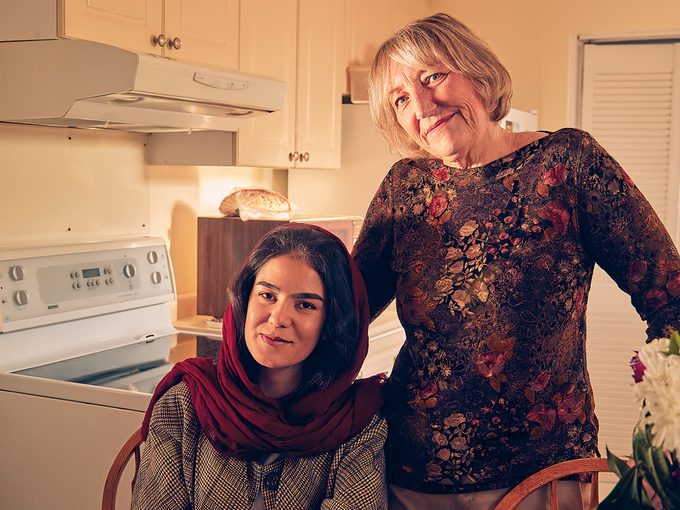
“She Is Just Like a Mom”
On a cloudy Saturday in September 2021, the temporary clothing-donation centre in a parking lot near Toronto’s Pearson International Airport was bustling with Afghan refugees staying at nearby hotels, all of them wearing face masks because of the pandemic. Fiona Harrower, a volunteer for Canadian Connections, the aid group sponsoring the event, was folding clothes that had not yet been given away.
“Did you see the young woman with the beautiful eyebrows?” Fiona’s co-volunteer asked. “Her name is Rukhshana. She asked if we had any books to give out.”
Fiona was intrigued. A retired teacher, she considered books as necessary to one’s well-being as three balanced meals a day. She wanted to learn more about this young stranger who loved reading. So a few days later, she and some colleagues met with the woman in a café in downtown Toronto. Fiona, 62, listened as Rukhshana Ahmadi, a member of the Hazaras—an ethnic and religious minority that has faced violent discrimination in Afghanistan—told her story.
She had worked as an English translator after studying at university. But following the Taliban takeover, she and her mother, aunt and three siblings headed to Kabul’s Hamid Karzai International Airport to try to leave. It was August 22, 2021. Inside the airport compound they became separated, but finally, Rukhshana saw them at a distance. “I had all of our papers in my hand and began waving at them. Then a suicide bomb went off. The world went black.”
She regained consciousness in the arms of a female U.S. soldier. The soldier was speaking to her, but Rukhshana couldn’t hear. Around them was a scene of horror. An anguished mother clutching her dead infant. A father collapsed over his daughter’s lifeless body. American soldiers everywhere, running and gesturing as they tried to secure the area.
“What happened?” Rukhshana asked, her voice croaking from the dust and debris. On a piece of paper the soldier wrote one word: “bomb.”
“What happened to my family?” she cried. “Where is my backpack?” It held her cellphone and passport.
She later learned that her family had been rushed from the airport and had made it home. Somehow, her torn backpack was recovered, but everything else, including a laptop and a book of stories her grandfather had given her years earlier, the pages turned so often they were shiny, was gone.
“That is why I asked for a book,” Rukhshana told the women in Toronto. “I need to read.”
At that moment, Fiona was startled by a sunbeam that cut through the clouds, illuminating the young refugee’s face. It’s a message from Mom, she thought, recalling a grey day a few years earlier when she had wandered through a local cemetery, looking for the perfect plot to bury her recently deceased mother. She found it when a sunbeam landed on a green hillock with a view, as if she were being instructed from beyond: Here.
Resolved, she turned to Canadian Connections co-founder Marcella Tomàs, seated beside her, and said, “I think I’m supposed to have this girl come live with me.”
Rukhshana’s move from her hotel did not happen quickly. First there was paperwork. The six-month contract the women signed seemed more like a landlord-tenant agreement than anything else, with Rukhshana expected to pay Fiona from the stipend she got from the government Resettlement Assistance Program, about $800 a month. But in January 2022, Rukhshana moved into the back-split home in Mississauga, Ont., where Fiona lived alone. It did not take long for the two women to forge a friendship, and a frank recognition of their cultural differences.
WE WERE ONCE STRANGERS. NOW WE ARE CREATING MEANINGFUL LIVES TOGETHER.
At times, Rukhshana, now 24, has been teary and uncommunicative, worrying over the fate of her family, who made it to Pakistan last fall. (She has applied for them to join her in Canada.) Fiona had a hard time understanding Rukhshana’s moods at first. Now she simply accepts that she doesn’t have to relate to her on that level—and, frankly, can’t.
“I didn’t leave my family behind, and I wasn’t in a bombing,” she says softly, fiercely protective of the young woman she now considers family. Adds Rukhshana, “Humanity is when you respect and accept each other.”
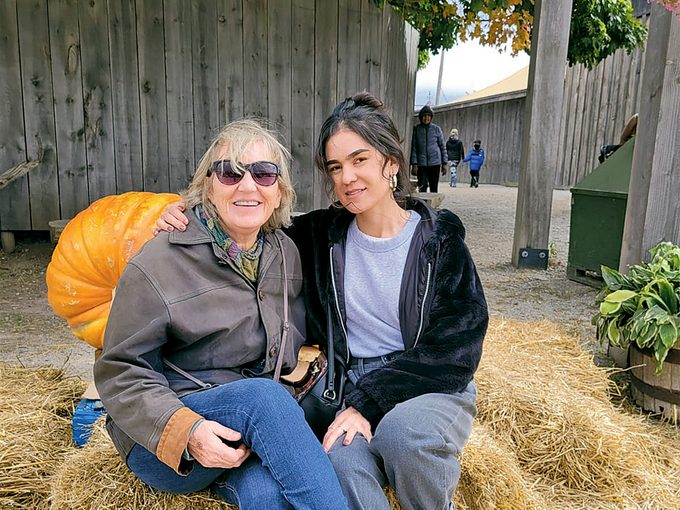
The two women are very much at ease around each other. “Talking is the main thing we do together,” says Rukhshana. “That, and watching programs on TV. One of our favourites is Survivor.”
Although their diets differ—Rukhshana’s is halal—the two have meals together when Rukhshana’s schedule allows it: she has begun an undergraduate degree in journalism. Indeed, the challenge these days is to make sure she catches the train to get to classes on time. “I’ve threatened to throw a bucket of cold water over her if she doesn’t get up,” Fiona says with a laugh. “I haven’t had to resort to that—yet.”
“Fiona is like a mom,” Rukhshana says, smiling shyly. “She does the same things my mom did for me to make sure I felt safe and loved. We may not have the same religion or skin colour, but we have kind hearts. We were once strangers on different sides of the world, and now we are creating meaningful lives together.”
Fiona knows that Rukhshana will probably go to live with her family when they make it to Canada, and she is supportive of that. However, both women know that when that time comes, it will be bittersweet. They are determined to remain close even when they no longer live together.
For now, Rukhshana tells Fiona with a smile, “I’m not moving. You’re stuck with me.” They laugh together, like old friends.
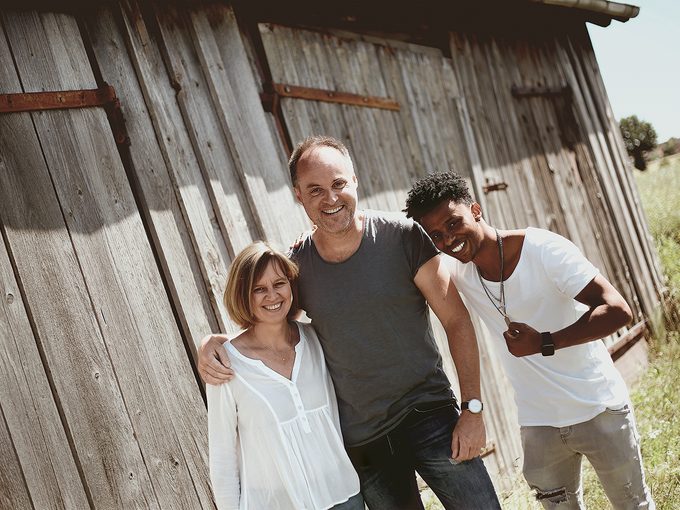
When Faith and Patience Truly Pay Off
Rainer and Maren Koch waited in the municipal government’s meeting room in Schaumburg, near Hanover, Germany, on a drizzly morning in January 2016. A small group of youth workers and parents were there, mostly silent, raincoats unbuttoned, hats clutched in their hands. They had come to meet young refugee boys, seven from Morocco and Algeria—and one from Eritrea: 14-year-old Samuel (Samuel is a pseudonym; he fears the Eritrean military would target family members there), who would be going home with the Kochs.
After more than three months of waiting with no word—after talking with their own four children (then aged 11 to 18) about their desire to host a refugee, after a visit from a youth welfare worker who told them they were expected to provide shelter to someone for six months and should be willing to pull the plug earlier if it was not working out—it had come down to these last few minutes.
“What if he has experienced violence that has made him hard?” Maren, a technical assistant in a pharmacy who also works in a residential program for disabled adults, had earlier asked her husband. “Can we cope with that? Can the kids cope?”
“Remember Hebrews 13:2,” replied Rainer, who works in church development and counselling. He reminded her that by being hospitable, “Some have taken in angels without knowing it.”
As the young refugees filed into the hall, Rainer, now 52, tried to read their expressions, the stubborn set of shoulders and feet that were barely picked up off the ground. “They must feel so alone,” he whispered to Maren. “Is this what it means to have lost everything?”
Then suddenly, as Samuel appeared before them, an idea that had once seemed nebulous took on the shape of a boy they knew nothing about, except for his name and that he belonged to the Eritrean Orthodox Tewahedo Church.
The couple spent 30 minutes with Samuel and an interpreter of Tigrinya, the language widely spoken in Eritrea. Rainer and Maren tried to communicate with the closed-off teen through hand gestures, pictures and smiles. But he barely looked at them and later, in the car, sat silently in the back seat, his eyes betraying no emotion.
Glancing at him in the rear-view mirror, Rainer thought, Something unexpected is beginning, a new phase of life for this family. He knew they were in it for better or worse, with no road map.
At first there was tension. Samuel spent a lot of time alone in his room, sullen. He was trying to make sense of his surroundings, of his new school, of a language he didn’t understand. Rainer and Maren did not know if his attitude was because of cultural differences, puberty or plain stubbornness.
Although a translator came once a week to help the family learn how to communicate with the youth, if there was progress, it was hard to see. Samuel sat at the family dinner table but didn’t eat a lot.
“If only he could see that we only want what is best for him,” Maren told her husband.
BIT BY BIT, AS HIS GERMAN IMPROVED, SAMUEL SHARED THE STORY OF HIS ESCAPE FROM ERITREA.
The six-month deadline for the end of his stay came and went—there was no way Rainer and Maren were going to let him go—and bit by bit, as Samuel’s German improved, he shared his story.
Without telling his parents, he said, at age 13 he fled Eritrea for Ethiopia and then Sudan, because the Eritrean military was conscripting boys. He had heard stories about child soldiers being physically abused, given meagre rations and paid little or nothing.
Once he reached Sudan, he called home to ask his parents for money because he needed to pay human traffickers to move him out of the country. Transported in open trucks through the Sahara desert toward Libya, after which he hoped to make it to Europe, he watched as other refugees fell off and were left behind to die.
His story finally out, and with a sense of security in his new home, Samuel began to change. He was more relaxed, and he laughed. Rainer and Maren’s children now considered him a brother, and they always had his back.
Today, Samuel is 21. All of his hard work to make a new life and to accept help from his German host family has paid off. Still living with the Kochs, he’s now a permanent resident of Germany, a high school graduate with a driver’s license and a job as an apprentice automotive mechatronics technician; he is learning to install components and maintain and repair cars.
Looking back, the Kochs attribute the positive outcome to having the confidence that unconditional love and openness would show the way.
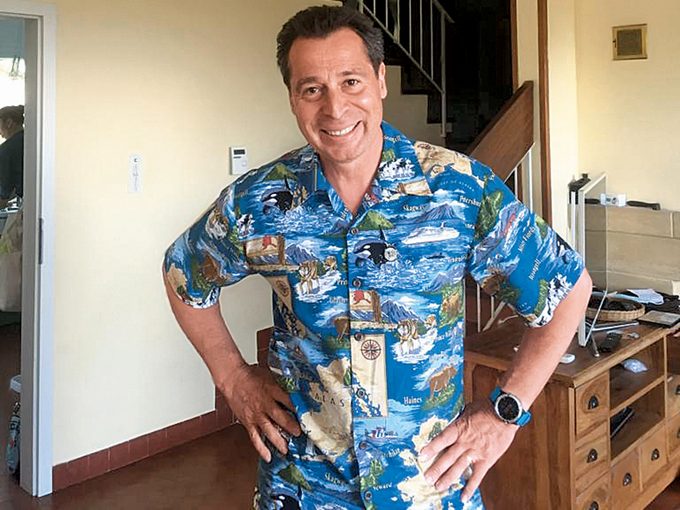
A New Home, a Second Family
It was early March 2022, and in Gex, a picturesque French town near the Swiss border, Maxim Artamonov was watching with growing horror the news of the Russian invasion of Ukraine.
Raised in Moscow but a citizen of Switzerland since 1992, the 52-year-old secretary general of a not-for-profit business association was both ashamed and angry. Putin’s “special military operation” was clearly a brutal, baseless war. More than one million Ukrainians had already fled for their lives.
I have to do something, he told himself. I have to help.
It didn’t seem fair to Maxim that he had a four-bedroom, two-bathroom home all to himself. His wife, Kemlin Furley, a representative for the UN High Commissioner for Refugees (UNHCR), was stationed 4,000 kilometres away in Tbilisi, Georgia, and their two sons were living in London.
His thoughts drifted to Tatiana Halchanskya, a gentle 60-year-old Ukrainian with a wide smile who had cared for their boys back in 2010, when Kemlin’s work for the UNHCR took them to Moscow. The family had kept in touch with Tatiana over the years, and Maxim knew she was now back in Ukraine—and that she was terrified. Her life with her husband in their house with a beautiful flower garden had been upended by the war.
Tatiana’s sister, Liidia Cherkasova, was still in Russia but was trying to get back into Ukraine to be with her husband and son. Their home was in the southeast, near the Zaporizhzhia nuclear power plant (later to be commandeered by Russia).
After talking it over with Kemlin, Maxim decided he’d give the sisters a safe place to stay, if they wanted it.
So that first week in March, Maxim used WhatsApp to message Tatiana and Liidia. “I am so sorry,” he wrote. “I feel so ashamed to be Russian. And I want to offer you shelter.”
Maxim first needed to get Liidia, 58, plane tickets so she could flee Russia. Because of sanctions against the country, she had to fly from Moscow to Casablanca, then to Geneva. Maxim met her at the airport on March 14 and drove her the 18 kilometres to Gex.
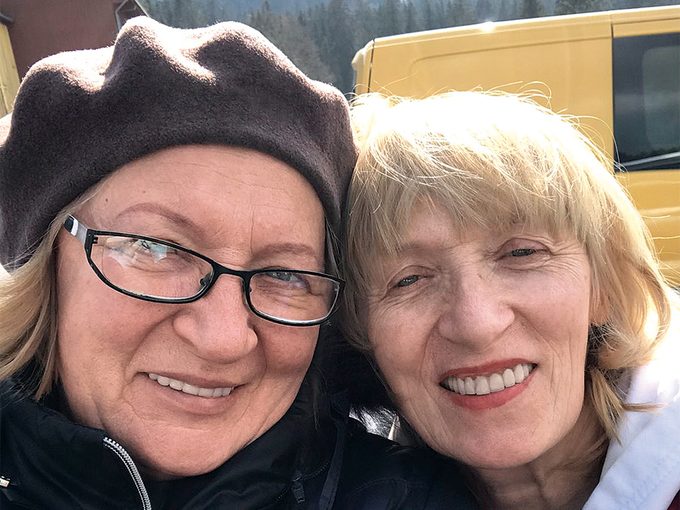
“You’re home now, for as long as you need it,” he said. Her demeanour as gentle as her sister’s, Liidia was grateful but worried about her husband, who has only one lung, and their son.
Around the same time, Tatiana’s husband was driving her on a white-knuckle 600-kilometre trip from their home in Kupiansk in eastern Ukraine to Kyiv, where they reunited with their son’s wife, Yunna Halchanskya, 32, and their toddler grandson, Herman.
Together, they continued to the Polish border, where the women and little boy said goodbye to Tatiana’s husband; he would stay behind with his son to fight. The trio then embarked on a series of train journeys totalling more than 1,900 kilometres, arriving in Gex one day after Liidia, exhausted and relieved to have found sanctuary.
For Maxim, there was no second-guessing his decision. These families gave a face to the war, and he could not look away. He set the sisters up with rooms in the main house, while Yunna and Herman moved into the apartment over the garage.
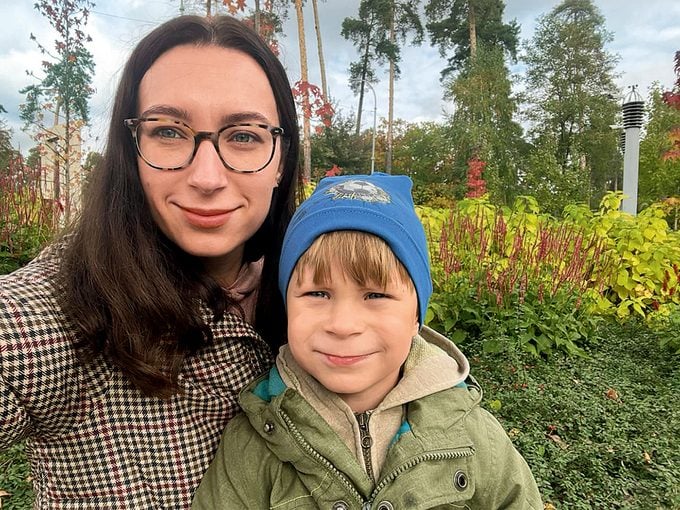
Herman turned four a few weeks after the family arrived in Gex and began attending preschool—in a new language, French. The three women took jobs painting and cleaning houses and gardening in order to send money home and give back to their host. Says Tatiana, “Work helps take our minds off of what is happening in our country, and to our men, to our homes.”
When the women weren’t working, they tended Maxim’s garden. In the surrounding area, they picked cherries, apples and walnuts, which they turned into jams, strudels and bread. At mealtimes, they would talk about their fears and tell Maxim what they missed about home.
Maxim gave them a credit card to use for food and everyday necessities while they waited for the French authorities to process their refugee claims. He taught Yunna how to drive a stick shift so she could borrow the car for the women to work their odd jobs.
Says Tatiana, “Maxim is our guardian angel.”
“We have become a family cobbled together because of war,” says Maxim. “And a family we will remain, no matter where we are.”
He says that for others who are considering welcoming refugees, it’s important that the decision be rooted in generosity rather than a sense of duty. “Simply put, you need an open heart. And I also benefit a lot from their presence, from their help and friendship.”
In June, Yunna’s husband got permission from the Ukrainian government to visit Gex for three weeks. At summer’s end, after nearly five months abroad, Yunna and Herman prepared to return to Kyiv, hoping the worst of the war was over.
“It’s hard leaving our little bubble,” she told Maxim as she and Herman hugged him at the airport. Her mother and her aunt were staying, their towns still too dangerous to go back to. “We have been so privileged,” Yunna said. “It is not a given for refugees to find such generous hosts.”
Maxim smiled. “You can always come back,” he said. “You have a home and family here, too.”
Next, find out how this artisan website became a grassroots disaster-relief organization.
